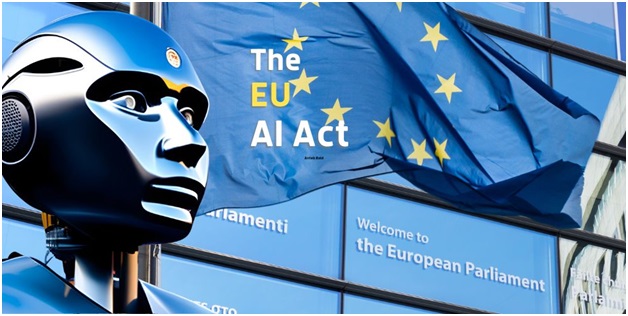EU’s Landmark Deal on Artificial Intelligence Regulation (Indian Express)

- 11 Dec 2023
Why is it in the News?
Recently European Union policymakers agreed on a provisional deal on landmark rules governing the use of artificial intelligence (AI).
On December 8, EU member states and lawmakers reached a consensus on the formulation of "historic" rules governing artificial intelligence models like ChatGPT, concluding prolonged negotiations.
However, these rules are slated to come into effect no earlier than 2025, allowing room for technological advancements in the interim.
Key Highlights:
- The inception of the Artificial Intelligence Act dates back to 2021, aiming to instil transparency, trust, and accountability in AI practices.
- Its overarching goal is to establish a framework to address risks to safety, health, fundamental rights, and democratic values within the EU.
- Featuring a two-tier approach, the Act imposes transparency requirements on all general-purpose AI models, with more stringent measures for the more powerful ones.
- The Act proposes the creation of an EU-wide database cataloguing high-risk AI systems, with provisions for the inclusion of future technologies meeting high-risk criteria.
- The legislation seeks a delicate balance between fostering AI adoption and preventing or mitigating harms associated with specific applications of the technology.
Global Perspectives on Artificial Intelligence Governance:
- The dynamic evolution of Artificial Intelligence (AI) development has prompted diverse global perspectives on the regulation of these technologies.
- In May 2023, members of the European Parliament reached a preliminary agreement on a revised draft of the European Union's ambitious Artificial Intelligence Act.
- This Act envisions the creation of an EU-wide database for high-risk AI systems and outlines criteria for the inclusion of future technologies that meet these high-risk parameters.
- In contrast, the United States currently lacks comprehensive AI regulations and has adopted a relatively hands-off approach.
- On the opposite end of the spectrum, China has, in the past year, introduced some of the world's initial nationally binding regulations specifically targeting certain types of algorithms and AI.
- It has implemented a law to govern recommendation algorithms, with a particular focus on how these algorithms disseminate information.
India’s Position on Artificial Intelligence:
- Initially, the Union Minister for Electronics and Information Technology stated that the government was not contemplating any legislation to oversee the development of AI in India.
- However, in the lead-up to the G20 summit in September 2023, the Indian government hinted at the potential regulation of AI.
- Officials indicated that the forthcoming Digital Personal Data Protection Bill 2022 would extend to AI developers engaged in creating and facilitating AI technologies.
- Given the substantial data collection and utilization by AI developers to train their algorithms and enhance AI solutions, they may be classified as data fiduciaries and held accountable for the responsible use of personal data.
- Prime Minister Modi recently expressed India's aspiration to "take a giant leap in AI to empower its citizens and actively contribute to its evolution."
- India is gearing up to host the Global Partnership on Artificial Intelligence (GPAI) Summit 2023 in New Delhi from December 12-14.
- As a co-founder of GPAI, India, along with 28 member countries and the EU, is committed to guiding the responsible development and utilization of AI.
